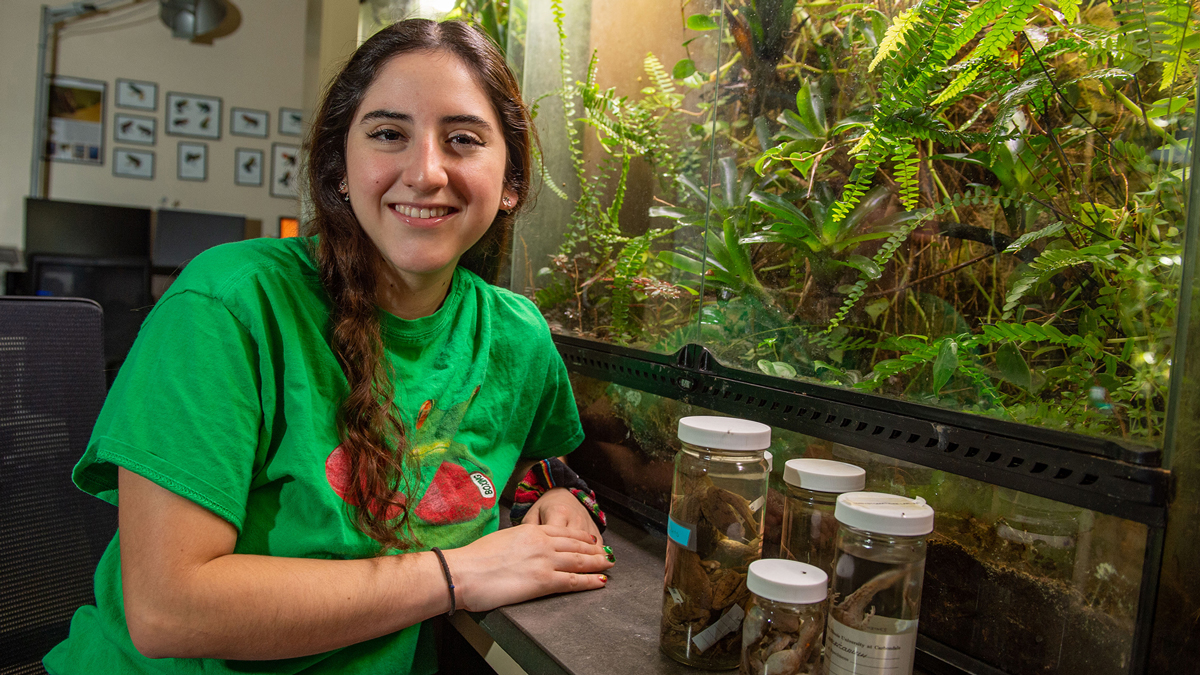
Photo by Russell Bailey
May 02, 2023
‘Phenomenal’ SIU zoology student wins national Goldwater Scholarship
CARBONDALE, Ill. – A science student from Chicago with Latin American roots is Southern Illinois University Carbondale’s latest Goldwater Scholar.
Aleida Iriarte, a member of the University Honors Program at SIU and a junior majoring in zoology and chemistry, won the prestigious award for outstanding students pursuing research careers in natural sciences, engineering and mathematics. Iriarte, who ultimately plans to become a researcher and advocate for conservation, was one of just 413 winners culled from nearly 1,300 nominations nationwide. Created by federal endowment in 1986, Goldwater Scholars have won impressive prestigious postgraduate awards, including the National Science Foundation’s Graduate Research Fellowship, Rhodes Scholarship and Marshall Scholarship.
As she prepared for college, Iriarte wanted to find a university that would help her build a strong science background and ground her in the fundamentals of conducting research. SIU’s reputation for offering research opportunities for undergraduates, along with a strong zoology program, led her to Carbondale.
“Those things put SIU on my radar pretty early on,” she said. “I knew I wanted to get involved in research early, so that was a big selling point for me.”
Upon arriving at SIU, Iriarte joined the University Honors Program, which challenges top undergraduate students to develop their own academic path within a comprehensive research environment, while also supporting them with individualized attention. The program allowed Iriarte to substitute core curriculum classes with honors classes that better fit her interests and career goals. In her first semester, Iriarte took an honors seminar, Sustainability and the Collective Imagination, taught by Jyotsna Kapur, director of the honors program. Students considered sustainability across multiple disciplines, worked collaboratively and learned about contemporary efforts, including meeting Jackson (Mississippi) Mayor Chokwe Antar Lumumba over Zoom.
Kapur said she identified Iriarte’s passion for sustainability and equity during that class.
Iriarte said she also benefited from the Research-Enriched Academic Challenge (REACH) program, which funds undergraduate research projects, and the McNair Scholars program, which supports promising first-generation and low-income students.
Ultimately, the support and mentoring connected her with Jason Brown, associate professor in the School of Biological Sciences, who involved her in DNA sequencing and analysis conducted through his laboratory.
Brown said Iriarte has since developed a broad set of tools that make her well-suited to excel as a student researcher, including working with geographic information systems and experience with evolutionary theory and bioinformatics. She also has a talent for effective writing and is an extremely driven and motivated student.
“She is also incredibly creative and always brings novel perspectives to the many research topics addressed in my lab,” Brown said. “Aleida is a phenomenal person. She’s super intelligent and a blast to be around, always emitting positivity, which is contagious.”
A connection to South America
Born in Bolivia, Iriarte’s family moved to Chicago when she was a small child. Her connection to the country in South America, which includes frequent trips to Bolivia, has instilled a great interest biodiversity conservation, Brown said.
“Bolivia is one of the poorest countries in South America and has some of the highest rates of deforestation,” Brown said. “She’s had firsthand observation of Bolivia’s predicament, and it has galvanized the idea that conservation biology doesn’t operate in a vacuum from human society. It has led Aleida to also advocate for the betterment of poorer countries as a conservation strategy.”
Iriarte said the deforestation problem is a major motivator.
“Bolivia is also full of rich culture, unique wildlife and beautiful natural areas, and I’m very proud to have been born there,” Iriarte said. "The connection to this country motivates me to work towards conservation efforts to preserve it.”
Chasing the Goldwater
The University Honors Program also introduced her to Elizabeth Donoghue, the assistant director who leads the major scholarship efforts, including offering a class each spring that prepares students to apply for these prestigious awards. Donoghue also became a mentor and major influence in the Goldwater application process, Iriarte said.
“I noticed the Goldwater Scholarship through the honors newsletter,” she said. “I had been looking for financial assistance for next year, and due to the research aspect of the Goldwater Scholarship, this was right up my alley.”
Donoghue said Iriarte has a relentless enthusiasm for intellectual inquiry.
“She is constantly seeking to improve herself while also helping those around her,” Donoghue said. “When she’s not in the lab, class or studying, you find her volunteering or participating in multiple extracurricular organizations for which she cares deeply.”
Iriarte said the biggest challenge for the Goldwater application was the research essay portion, which she decided to model on what she hopes to be her honors thesis project. Her research is centered on evolution and chemical ecology with a focus on how human impacts on the environment shape the evolution of species and affect biodiversity.
“It was still not fully fleshed out, but having to write the essay forced me to sit down and finish planning the project, which was ultimately helpful, but stressful at the time,” she said. Along with financial support, she also will participate in Goldwater social events with other students during the next few months.
Looking ahead to making a difference
Iriarte’s ultimate goal is to earn a doctorate in zoology and become a researcher at a university.
“I want to study the interplay of evolution, animal behavior and chemical ecology,” she said. “I’d like to use my position as a university professor and researcher to advocate for the conservation of biodiversity and the diversification of STEM.”
